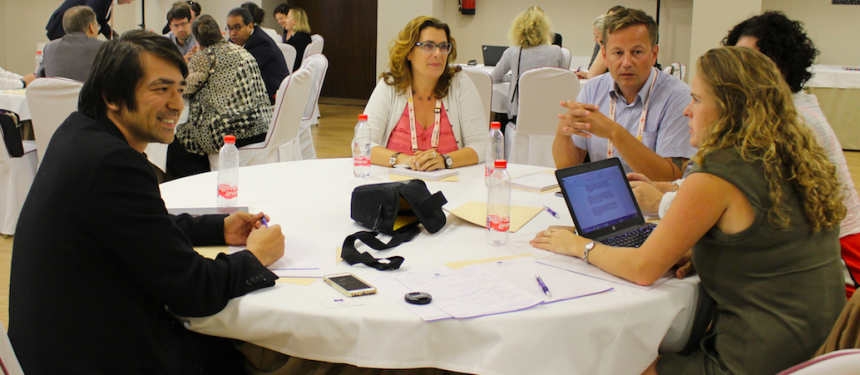“It’s not a nice brand to be a refugee”. This was one of the compelling messages that came through at an EAIE-convened policy dialogue on the integration of refugees into the higher education systems of Europe.
News and business analysis for Professionals in International Education
Have some pie!
We don’t like the label refugee, HEIs are told
 Yama Saraj spoke of his own family's experience as refugees and that the label of refugee "kind of degrades me". Photo: The PIE News
Yama Saraj spoke of his own family's experience as refugees and that the label of refugee "kind of degrades me". Photo: The PIE News The session ensured key stakeholders and speakers came together to focus on how better to deal with the significant challenge facing all higher education institutions, namely, how better to facilitate entry to university for refugees and ensure their integration and success.
Yama Saraj, an entrepreneur of Afghani descent who arrived in the Netherlands as a boy – when his mother sought refugee status – was insightful in sharing his own experience.
“I’m a proud man and I don’t want sympathy,” he explained to the stakeholders present. “An expat is more of a fancy term, or someone of transnational identity.”
Ahmad Al-Rashi, a Syrian refugee now studying at SOAS in London, also underlined that refugees are hugely determined to make the most of a second chance in higher education, and while they have distinct needs, they don’t want to be segregated.
He delivered a powerful presentation on the urgent need to help educate refugees, pointing out that up to half of the tertiary population in Syria is now displaced, while Anasse Bouhlai of UNESCO’s regional bureau in Lebanon spelled out that there are 22.5 million refugees in the world.
“Up to half of the tertiary population in Syria is now displaced”
Other stakeholders at the EAIE session shared their own experiences on integrating refugees into HE.
The importance of ensuring language proficiency was underlined, with a local university in Seville revealing that it works with the refugee population via local government departments, with social workers helping direct refugees on to a language course, which the university funds and delivers and certifies.
Certification for refugees is profoundly important, and proof of language skills can help them obtain employment, for example.
Beyond individual initiatives, national efforts were shared, in the Netherlands, for example, where a Pre-Bachelors for Refugees program is delivered by five universities and was government-funded in the first year.
Elke van der Valk at Fontys University of Applied Science explained the program was “very popular” and focused on culture as well as language, answering questions such as ‘how does civil society work?’.
A curated foundation program such as this enabled students to flourish on subsequent programs undertaken. Some level of Dutch was required from the 30 students who undertook the first course and the program is now starting for the second year.
And in Norway, Einar Meier of NOKUT, the national standards agency, detailed two national pathway programs for refugees that are offered via designated universities, ensuring that teachers and nurses can succeed in the education system.
Stig Arne Skjerven, director of foreign education at NOKUT, was one of the organisers of the session. He told The PIE News, “an important element in the discussion was; what is the next step? Can the participants and EAIE facilitate mutual learning by sharing the experiences from relevant projects from Europe and beyond?.”
Skjerven and his colleague Marina Malgina were awarded the Bo Gregerson award at this year’s EAIE Conference for their work supporting the European Qualifications Passport for Refugees.
He acknowledged, “Many participants stressed the need to mainstream the different refugee related initiatives and to make them part of the regular procedures of the universities.
“In addition, it is important to learn from and strengthen cross-border initiatives such as European Qualifications Passport for Refugees by Council of Europe.”
Samir Heco at the Council of Europe provided an update for participants on this pilot scheme, which has so far awarded 53 qualifications passports and interviewed 62 refugees.
The program has been a step forward in enabling refugees, particularly those lacking proof of credentials or education level, to provide a certified “assessment document”.
“This cannot provide a formal recognition decision,” he explained, “or guarantee admission to study programs or jobs.”
But, “the long-term objective of the pilot project is the transportability of this assessment document.”
• Read our current blog on ‘Can the HE sector do more to welcome refugees?’
Still looking? Find by category:


